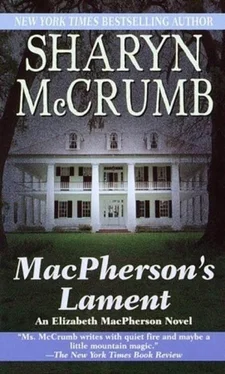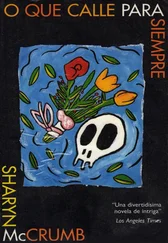Sharyn McCrumb - MacPherson's Lament
Здесь есть возможность читать онлайн «Sharyn McCrumb - MacPherson's Lament» весь текст электронной книги совершенно бесплатно (целиком полную версию без сокращений). В некоторых случаях можно слушать аудио, скачать через торрент в формате fb2 и присутствует краткое содержание. Жанр: Детектив, на английском языке. Описание произведения, (предисловие) а так же отзывы посетителей доступны на портале библиотеки ЛибКат.
- Название:MacPherson's Lament
- Автор:
- Жанр:
- Год:неизвестен
- ISBN:нет данных
- Рейтинг книги:3 / 5. Голосов: 1
-
Избранное:Добавить в избранное
- Отзывы:
-
Ваша оценка:
- 60
- 1
- 2
- 3
- 4
- 5
MacPherson's Lament: краткое содержание, описание и аннотация
Предлагаем к чтению аннотацию, описание, краткое содержание или предисловие (зависит от того, что написал сам автор книги «MacPherson's Lament»). Если вы не нашли необходимую информацию о книге — напишите в комментариях, мы постараемся отыскать её.
MacPherson's Lament — читать онлайн бесплатно полную книгу (весь текст) целиком
Ниже представлен текст книги, разбитый по страницам. Система сохранения места последней прочитанной страницы, позволяет с удобством читать онлайн бесплатно книгу «MacPherson's Lament», без необходимости каждый раз заново искать на чём Вы остановились. Поставьте закладку, и сможете в любой момент перейти на страницу, на которой закончили чтение.
Интервал:
Закладка:
“I don’t understand,” said Flora Dabney, swabbing her damp forehead with a little square of cambric. “Surely one of our interpretations might be right.”
“And you’re getting no reading on the metal detector?” asked Ellen Morrison with a worried frown.
“None,” I said.
“Well, I can’t figure out what we are doing wrong,” said Lydia Bridgeford. “Of course, my father didn’t write those instructions!”
“No,” Dolly Smith replied. “Your father spent his gold as fast as he could.”
“Wait,” I said before the bickering could begin again. “There is a possibility we haven’t considered. The directions could be perfectly correct-for 1865. But the island may have changed since then.”
They looked at me with widening eyes, considering the implications of what I said. Finally Mary Lee Pendleton nodded and whispered, “Hurricanes.”
“Yes. There have been quite a few bad hurricanes in the last hundred and thirty years, and at least half a dozen of them have hit this part of the eastern seaboard.”
Ellen Morrison shivered. “I remember Hazel in ’54. I was so frightened. I just stood at my window watching trees fall.”
“So you think a storm has altered the island since Dolly’s father buried his share of the gold here.” It wasn’t a question. Flora Dabney’s tone said that she knew I was right.
“Look at the instructions,” I said. “Go from that tree-or any of these trees for that matter-and walk twenty-five paces and turn left. You can’t. And there are even more paces to walk after that, heading west. Do you see where that would put you?”
Dolly Hawks blinked back tears. “In the sea,” she whispered.
“People get treasure out of the sea,” said Lydia Bridgeford, patting her arm. “National Geographic had an article about some skin divers who found a sunken Spanish galleon.”
“But it took them years,” I reminded her. “And it cost millions. I don’t think a saddlebag full of gold bars would be worth quite that much, even at today’s gold prices. Maybe two million, tops. If you financed an expensive recovery operation, you’d be lucky to break even. And the publicity would alert the government, who would probably confiscate the gold anyhow. The Confederacy took it from the U.S. mint in the first place, remember?”
“Besides,” said Ellen, “we probably wouldn’t live to see the recovery anyhow. I say we take what we have and enjoy ourselves.”
Flora Dabney gazed out at the sea with a thoughtful frown. “I had hoped we would have more than a million and a half. After all, there are eight of us. We’ll have medical expenses.”
“We can invest the money,” said Mary Lee Pendleton. “If we don’t live extravagantly, we’ll be fine.”
“We could always sign a book deal,” said Dolly Smith. “I hear that pays well.”
We went back to the inn after that and had seafood salads for lunch while we talked about what our respective ancestors did in the war. “But we mustn’t go on about it too much,” Flora Dabney whispered to me after my story about the Battle of Fort Fisher. “You know, poor dear Julia is the only soldier’s widow here, but she isn’t, strictly speaking, a Confederate woman. The late Mr. Hotchkiss was a Yankee from Abingdon. The mountains had a lot of Union sympathizers, you know.”
“Why did you let her in the Home?” I whispered back.
“Well, dear, that was a long time ago. And we felt we had a great deal in common. It’s our little secret.”
Julia Hotchkiss reached for the last three hush puppies, blissfully unconcerned with her guilty secret.
After lunch, I left them to pack for points unknown and drove back to Danville-with nothing to think about but the other civil war in my life. MacPherson vs. MacPherson in divorce proceedings. A house divided against itself cannot stand. I wondered if I would prove any better than Abe Lincoln at preventing a secession.
“Well, here we all are,” I said brightly for the tenth time. I was smiling like a neon sign. I could feel every muscle in my face. “Here we are.” I glared at Bill, mentally nudging him to say something positive, because I could feel my words falling with a crash into the center of this silent, strained family reunion. Our parents were in Bill’s apartment, summoned at our request, politely sipping tepid white wine out of jelly glasses and behaving like hostages who were determined to be civil to their demented captors.
“Yep!” Bill caught my glare and straightened up with a nervous start. “Here we are,” he chirped, flashing our parents an oafish grin, which they returned with plaster smiles.
They wouldn’t look at each other. They sat as far apart as it is possible to get in the hamster cage that Bill calls a living room. Mother passed the time between sips by asking me carefully neutral questions about Cameron, and how things were in Scotland. She seemed determined to consider Dad a large, quaint piece of sculpture that she refused to comment on. Dad resembled a guilty schoolboy who has been hauled to the principal’s office for a well-deserved whipping: determined to brazen it out by feigning indifference. Meanwhile my brother the host, to whom housecleaning is an unconfirmed rumor, kept offering to run out to the store for everything from napkins to crushed ice, but I knew better than to let him act on these alleged impulses of hospitality. He would run out to the store, all right. Probably to one in the next state, and he would contrive to prolong the errand until he could be sure his guests had fled. I wasn’t about to be left holding this unsavory bag.
So there we were, all of us absolutely miserable, but determined to do a wooden impersonation of a normal family. In my fifth-grade history class we read the story about the little Spartan boy who put a fox cub in his tunic on the way to school, and then sat quietly through his lessons while the captive beast gnawed at his belly until the boy keeled over dead. That lad’s spiritual descendants are my immediate family-and almost the entire population of my adopted country-and I am as exasperated about it as the fox was!
It was evident that my Waspish middle-class family members considered themselves far too well-bred to indulge in shouting matches or other forms of honest, but unseemly behavior. If left to their own devices, they were perfectly capable of making innocuous small talk for the entire interminable evening, while the real issues seethed below the surface, unexpressed, but tormenting everyone. Now, my life among the stiff-upper-lip crowd in Britain had not exactly enhanced my ability to advocate plain-speaking, but the knowledge that my stay in the United States was limited compelled me to introduce a little reality into the proceedings. I couldn’t afford to wait out the months that would elapse between innuendo, ironic aside, inter-family conferences, and finally the reproachful understatement of a by-then-insoluble problem. I had a plane to catch.
In a lull just after Dad’s monologue about the Cincinnati Reds and Mother’s last question about the weather in Edinburgh, I said, “Look, folks, this is a charming family reunion, and I really appreciate your coming over to welcome me back, but could we stop shoveling the-the social pleasantries here and talk about what’s really going on?”
Just for a fraction of a second they glanced at each other. Then after one of those little pauses, reminiscent of the silence between the lighting of the fuse and the instant of detonation, Mother said, “What is that, dear?”
“You told her about the separation yourself, remember?” said Bill. “And I told her everything else. Even the goldfish injunction.”
Mother looked thoughtful. Finally she gave a little shrug, smiled, and said, “We have always tried to shield you children from any unpleasantness. I suppose, though, that you are no longer children.”
Читать дальшеИнтервал:
Закладка:
Похожие книги на «MacPherson's Lament»
Представляем Вашему вниманию похожие книги на «MacPherson's Lament» списком для выбора. Мы отобрали схожую по названию и смыслу литературу в надежде предоставить читателям больше вариантов отыскать новые, интересные, ещё непрочитанные произведения.
Обсуждение, отзывы о книге «MacPherson's Lament» и просто собственные мнения читателей. Оставьте ваши комментарии, напишите, что Вы думаете о произведении, его смысле или главных героях. Укажите что конкретно понравилось, а что нет, и почему Вы так считаете.












